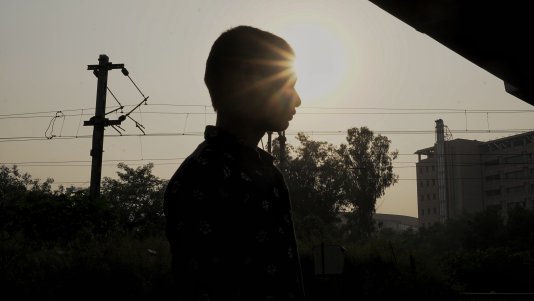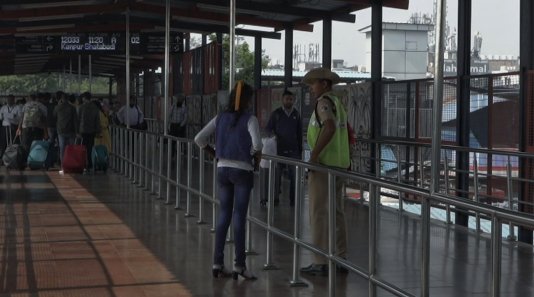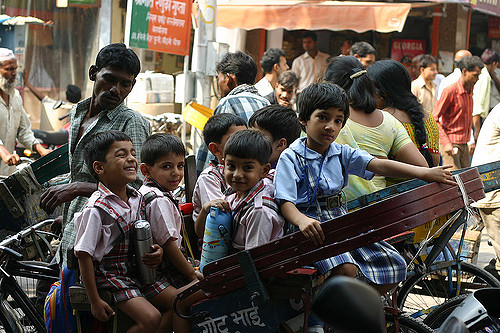- About
- Topics
- Picks
- Audio
- Story
- In-Depth
- Opinion
- News
- Donate
-
Signup for our newsletterOur Editors' Best Picks.Send
Read, Debate: Engage.
| December 17, 2022 | |
|---|---|
| topic: | Child rights |
| tags: | #India, #child rights, #child labour, #human trafficking |
| located: | India |
| by: | Hanan Zaffar, Jyoti Thakur |
The early-morning haze started engulfing the Indian capital. It was this on December day when Raju (an alias), a 15-year-old boy from Madhya Pradesh, arrived on platform 16 of New Delhi's railway station. A gaunt and shy teenager, Raju ran away from home to escape the labourious work his father forced him into.
"He used to mercilessly beat me up if I didn't accompany him to work," Raju told FairPlanet.
According to data collated by Railway Children, an international organisation working with street children, every eight minutes a child goes missing in India, as thousands of children across the country board trains with no destination in mind - primarily in the hope of escaping poverty and abuse at home or simply leading a better life.
"I was never happy at home," Raju added. "My parents stopped sending me to school after the eighth grade, because I was the oldest child and I had to start earning money."
Raju's tale resembles the living reality of many children in India.
Karan (an alias), who would seldom go outside his village in the Aligarh district of Uttar Pradesh, boarded a train to Delhi without a ticket earlier this year, leaving his abusive father and uncle behind. However, unaware of the vastness of the city, the 16-year-old accidentally reached the Old Delhi railway station instead of New Delhi.
"I got very scared because I barely knew the way to my brother's rented place from Old Delhi railway station," Karan told FairPlanet.
"I had come to the city in search of my elder brother. He has a job here and he promised me that he would give me some money so I could travel to a different state, find work and live far from my family."
Around 13,555 trains run on an average day in India, carrying over millions of passengers under the flagship of Indian Railway - the largest rail network in Asia.
"Over 400 trains depart from or reach Delhi on a daily basis. These trains are one of the most affordable and easily accessible modes of transportation for the people in India. So it is for the children who generally board trains in the hope to find a safe space for themselves," Anjani Tiwari, an executive council member at Salaam Baalak Trust, told Fair Planet. The trust provides care, counselling and shelter to the lost children.
"These children are usually compelled to leave their homes for various reasons," Tiwari added. "Normally, it's their parents who ask them to go to cities and look for work. But sometimes, it's also the unsafe environment at home which forces the kids to run away."
Essentially registered as missing children in the National Crime Records Bureau (NCRB), the number of such lost children witnesses an uptick almost every year.
According to the latest data by NCRB, 59,262 children went missing in India in 2020. With 48,972 children remaining untraced from the previous years, the total number of missing children accounts to 108,234.
While less than half of these children are ever found, most of them remain at a high risk of getting physically and sexually abused.
"Although railway stations are operational day and night and considered to be safe because of the high presence of security personnel, many lost and runaway children are usually found in the vicinity of railway stations and tracks where they are forced into vicious networks of trafficking, begging, prostitution, domestic work or child labour," Tiwari said.
Every morning, the outreach team of Childline - an organisation working in collaboration with the Salaam Baalak Trust - deployed at the Old Delhi and New Delhi railway stations surfs the platforms and tries to discreetly identify kids who seem abandoned or are accompanied by anyone suspicious.
They look for any child who may ostensibly be in need of help.
"After we manage to identify such kids and successfully bring them into our safety net, our counsellors ask their whereabouts, what compelled them to leave home and other related questions," Meena Kumari, a coordinator at Childline Old Delhi Railway Station, told FairPlanet.
It was Kumari’s organisation that found Raju and Karan at a railway station in the national capital and brought them to a shelter home run by Salaam Baalak Trust.
"Once the kid has been fed and made comfortable with our presence, we then take the child to the police station - to get the case registered under relevant sections - and to the hospital in order to check if the child has been abused or assaulted in any manner," Meena added.
Scores of kids are rescued every day by the Childline team. "The footfall of children on platforms increases during specific festivals or farming seasons and so does the risk of trafficking," said Sadiq Iqbal, another member of the outreach team.
"There are times when we are not able to rescue any kid," Iqbal added. "But naturally, we feel very happy when we are able to safely rescue any child.”
Once the team completes the preliminary counselling and medical examination mandated under the Juvenile Justice Act of India, the child has to be brought before the Child Welfare Committee (CWC) of the government - formed under the same act - within 24 hours.
The children are then counselled to reveal the details of their family. "If they tell us the name, mobile number and address of their parents or guardians, we immediately initiate the process of contacting the district branch of CWC to locate their parents," Meena said.
Such details were divulged in Karan's case, and therefore it was easy to trace his family. But in cases where the child is unable or unwilling to reveal any information they are placed under the care of a children’s home.
The organisation says that children are put in a shelter home either short or long-term - until they are reunited with family members.
Salaam Baalak Trust runs seven such shelter homes - five for boys and two for girls - in Delhi, aiming to provide a safe space to over 10,000 children.
By copying the embed code below, you agree to adhere to our republishing guidelines.



